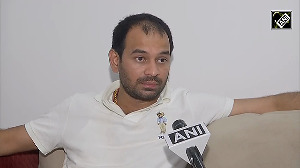The Indian Bottled Water Manufacturers' Association has suggested that municipal and other controlled water supply sources should be asked to adhere to the quality standards set for the packaged water industry.
Welcoming the new standards set for the companies, IBWMA, in a release issued here, said: "Pesticide residues are present in mass consumed foods such as cereals, fruits, vegetables, soft drinks, milk and even in municipal water.
Why then is the bottled water industry being singled out? Moreover, the industry has been complying with standards set and testing methods stipulated by the authorities themselves." The association represents manufacturers of packaged water brands such as Bailley, Zero B, Spakel, Brilliant, MacBlue and others.
"The IBWMA has been able to impress the government on the need to announce the date of implementation of the new norms only after the report of the health ministry's technical committee is made public after taking into account the association," the release said.
Another issue the IBWMA is taking up is the manner in which the report on pesticide residues compiled by the Delhi-based Centre for Science and Environment has resulted in the vilification of the entire packaged water industry, Bureau of Indian Standards, and the Food and Drug Authority.
IBWMA president Rajeev Sehgal said: "In the wake of the growing menace to consumer health from pesticides present in the food chain, due to their presence in soil andsurface /groundwater, the association has recommended that the ministry of agriculture be involved in containing the problem of pesticides in crops and other agricultural produce."
IBWMA has suggested the setting up of a committee by the FDA under the Union health ministry to thoroughly study the approval and usage of pesticides in India and their impact on human health.
The release pointed out that India was a signatory to the WTO agreement which sets down Codex guidelines that are based on WHO standards for drinking water quality.
According to Sehgal, WHO norms are flexible and permit each country to establish its own standards based on factors applicable to it.
For example, that permissible European Union limit for Lindane residue is 0.0001 mg per litre, while Codex permits 0.0002 mg per litre (100 per cent more) and for Alachlor it is 0.0002 and 0.2, respectively, (20,000 per cent more).
"Does this mean that Americans drink more poisonous water than Europeans?" he asks.
Although water purification systems effectively reduce levels of pesticides, results cannot be compared to those in EU countries due to different initial concentration levels in the source water supplies.
"For example, DDT was banned in Europe some 20 years ago, but has been used in India till recently," he says.
Moreover, many toxic wastes in the west are being dumped in India and it is imperative to restrict their entry into India before highlighting their residual values in water.
Referring to the upgrading of technologies and installation of new plants to meet the revised standards, the association feels that the 700-odd licensees mostly from the small scale sector will be severely disadvantaged on the investment front compared to big players.
Yet, it believes this does not justify Indian standards being lower than international norms when it comes to consumer health. Apart from safety issues, in sheer economic terms too India will lose out on international markets.
However, the association advocates that implementation must not be hasty but proceed in a phased manner, preceded by debate and research on different standards, involvement of industry, upgradation of detection equipment, testing methods in the country, and monitoring mechanisms.
"Upgradation of quality is a continuous process and must be reviewed periodically to accommodate new developments. We have put forth to the Union health ministry a series of recommendations that would introduce standards to protect consumer health and are in line with the environmental, economic, social, geographical conditions prevalent in the country and its agricultural and import policies," the release says.






